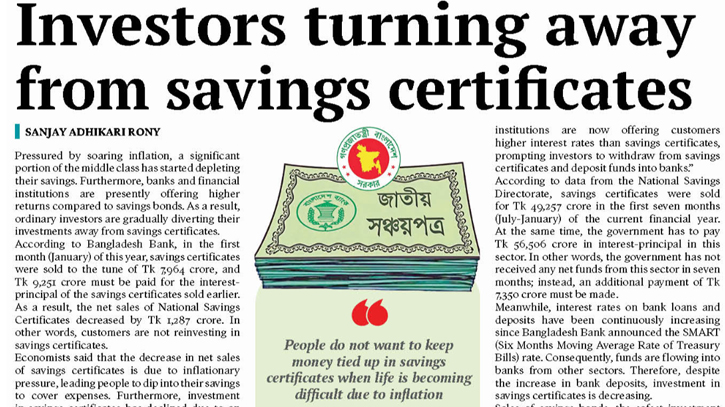
Pressured by soaring inflation, a significant portion of the middle class has started depleting their savings. Furthermore, banks and financial institutions are presently offering higher returns compared to savings bonds. As a result, ordinary investors are gradually diverting their investments away from savings certificates.
According to Bangladesh Bank, in the first month (January) of this year, savings certificates were sold to the tune of Tk 7,964 crore, and Tk 9,251 crore must be paid for the interest-principal of the savings certificates sold earlier. As a result, the net sales of National Savings Certificates decreased by Tk 1,287 crore. In other words, customers are not reinvesting in savings certificates.
Economists said that the decrease in net sales of savings certificates is due to inflationary pressure, leading people to dip into their savings to cover expenses. Furthermore, investment in savings certificates has declined due to an increase in bank interest rates.
According to Central Bank data, deposits in the banking sector were Tk 16.40 lakh crore in November last year, increasing to Tk 16.54 lakh crore in December. That is, deposits in the bank sector increased by Tk 13,259 crore in a month.
In this regard, Khondaker Golam Moazzem, Research Director of the Center for Policy Dialogue (CPD), told The Daily Messenger, “People in the country are now averse to saving due to high inflation. Instead, they are covering family expenses by withdrawing previous deposits. Additionally, banks and financial institutions are now offering customers higher interest rates than savings certificates, prompting investors to withdraw from savings certificates and deposit funds into banks.”
According to data from the National Savings Directorate, savings certificates were sold for Tk 49,257 crore in the first seven months (July-January) of the current financial year. At the same time, the government has to pay Tk 56,506 crore in interest-principal in this sector. In other words, the government has not received any net funds from this sector in seven months; instead, an additional payment of Tk 7,350 crore must be made.
Meanwhile, interest rates on bank loans and deposits have been continuously increasing since Bangladesh Bank announced the SMART (Six Months Moving Average Rate of Treasury Bills) rate. Consequently, funds are flowing into banks from other sectors. Therefore, despite the increase in bank deposits, investment in savings certificates is decreasing.
Sales of savings bonds, the safest investment for common people, have fallen due to various austerity measures, resulting in negative net sales. Additionally, the government must pay interest-principal from the treasury, according to the experts.
Regarding the decline in the sale of savings certificates, Dr Zahid Hussain, former chief economist of the World Bank’s Dhaka office, told The Daily Messenger, “People do not want to keep money tied up in savings certificates when life is becoming difficult due to inflation. Interest in savings certificates has also decreased due to a low-income tax limit and mandatory return submission. Due to procedural complexity, there are fewer buyers of savings bonds at post offices compared to banks.”
According to data from the National Savings Directorate, 11 schemes are currently in operation, sold through 1,307 branches of various scheduled banks and 1,500 branches of various post offices under the Directorate of Posts. Presently, the profit rate of full-term family savings certificates is 11.52 percent, the profit rate of three-month profit-based savings certificates is 11.04 percent, the profit rate of five-year Bangladesh savings certificates is 11.28 percent, and the profit rate of pensioner savings certificates is 11.76 percent.
Messenger/Sajib








